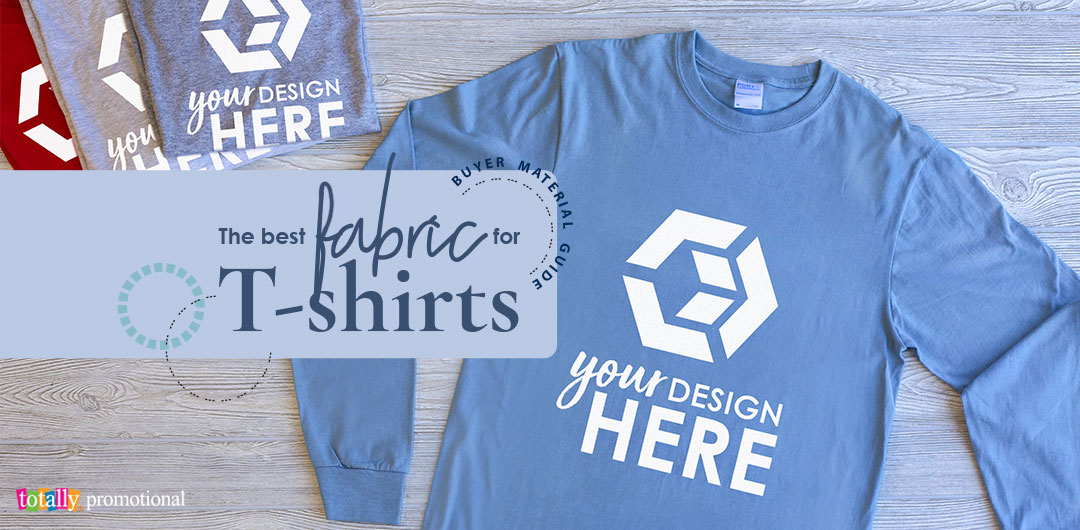Knowing how T-shirt fabrics look and feel when worn is essential when shopping online. That’s why it’s important to know what is the best fabric for T-shirts.
The fabric used for T-shirts determines comfort, style and durability. The shirt material you choose should reflect your preference for stretchiness and moisture-wicking ability.
Even the softest cotton T-shirts won’t make you smile unless they fit your body and your wallet. Top T-shirt brands at Totally Promotional, such as Gildan®, Port & Company® and Hanes® offer high-quality cotton and cotton-polyester blend fabrics to meet all those needs.
T-Shirt Material Guide
Take the stress out of ordering T-shirts for your group. Use our shirt material guide to select the right logo T-shirts for everyone on your list!
100% cotton T-shirts
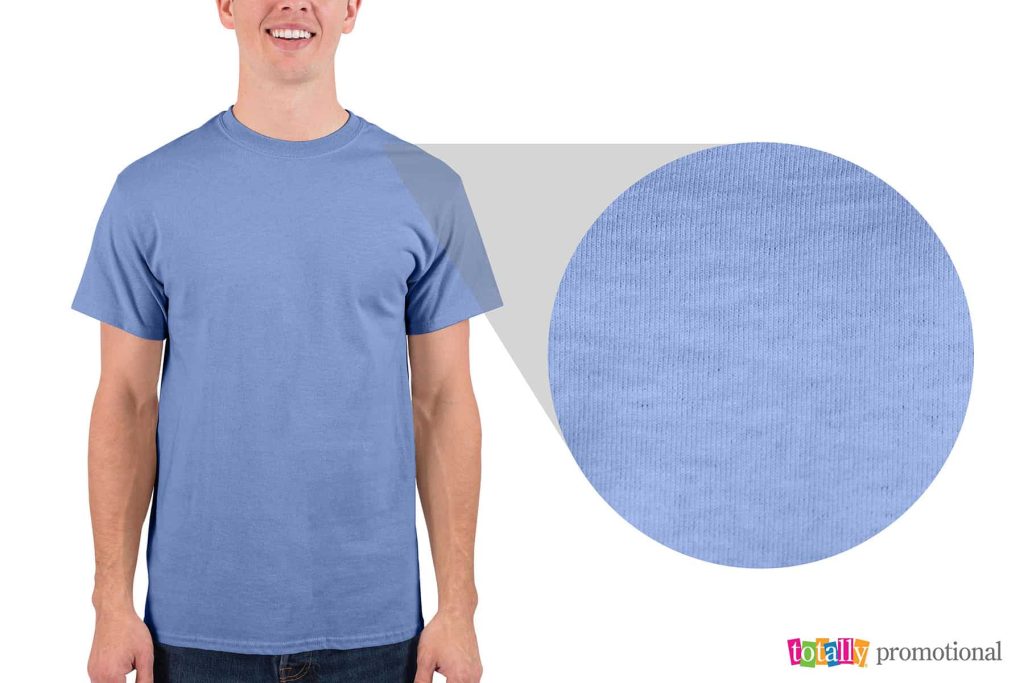
Cotton is a staple fiber made from the genus Gossypium plant. It’s a soft, fluffy material that is spun into yarn and used to weave those weekend tees we adore. A big shout-out to Eli Whitney and his cotton gin!
Manufacturers have been selling 100 percent cotton T-shirts since the 19th century when they debuted as a lightweight undergarment. Today, they are one of the most popular articles of clothing on the planet.
Pros for 100% cotton T-shirts:
- Pure cotton fabrics “breathe” to help keep your body cool and dry.
- Cotton stays fresher and cleaner-smelling longer than other materials.
- Cotton fabrics are hypoallergenic and rarely cause skin allergies.
- Tightly woven cotton is incredibly soft and remains that way after washing.
- Cotton is biodegradable and more eco-friendly.
Cons for 100% cotton T-shirts:
- Cotton is more prone to shrinkage.
- Cotton will wrinkle quicker than other T-shirt fabrics.
- Thinner-weaved cotton fabrics have shorter lifespans.
- 100% cotton tees can cost more than blended fabrics.
Industry tip: 100 percent cotton T-shirts are highly recommended for youth athletics and outdoor workers.
A customer favorite: Gildan® Heavy Cotton T-Shirt
Cotton-polyester blend T-shirts
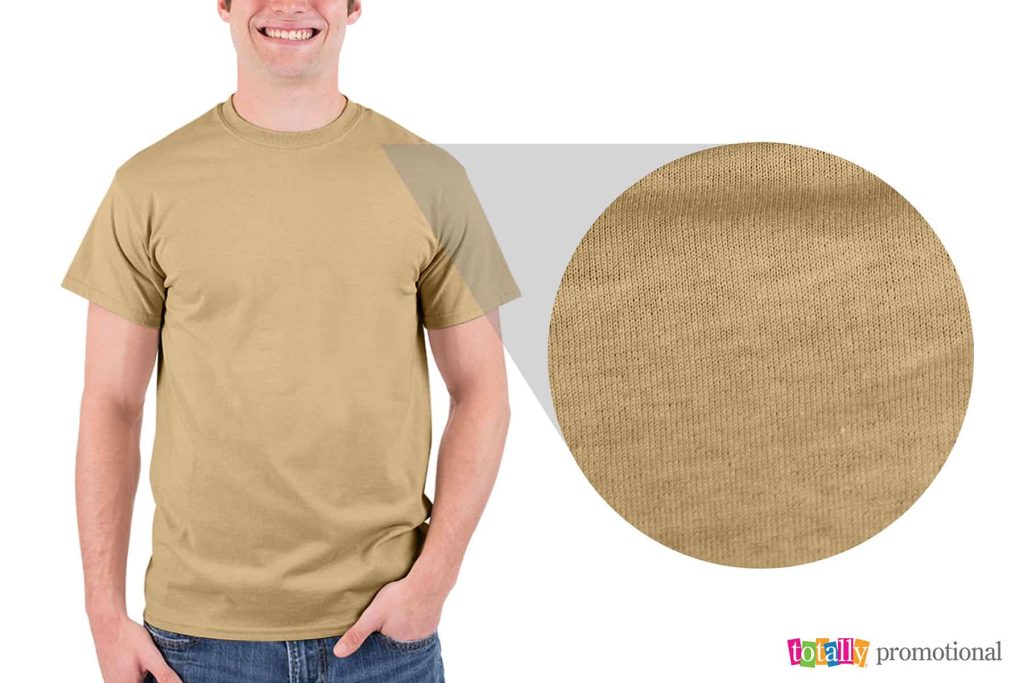
Unlike cotton, polyester is a processed fabric invented by Dupont in 1951. If you’re old enough to remember leisure suits, you’ll understand why polyester got a bad rap early on. However, manufacturing processes have greatly improved; today’s polyester has a softer, modern look and a more comfortable feel. Blending polyester with cotton was an epic idea and a true match made in heaven!
The combination of cotton and polyester fibers brings many positives to the table, including durability. The majority of custom T-shirts and sweatshirts at Totally Promotional are a popular 50/50 blend of cotton and polyester.
Pros for cotton-polyester blended T-shirts:
- Draws strength from the duo of fibers.
- Cotton-polyester is tear-resistant.
- Polyester creates wrinkle resistance.
- Cotton-polyester tees have less shrinkage.
- The blend is often cheaper than a single fabric.
Cons for cotton-polyester blended T-shirts:
- Polyester makes it less breathable than cotton alone.
- It typically costs more than 100% polyester.
- The blend isn’t as comfortable as other fabrics in hot weather.
Industry tip: Cotton-polyester blended T-shirts are highly recommended for company shirts and sports jerseys.
A customer favorite: Gildan® DryBlend T-Shirt
Tri-blend T-shirts
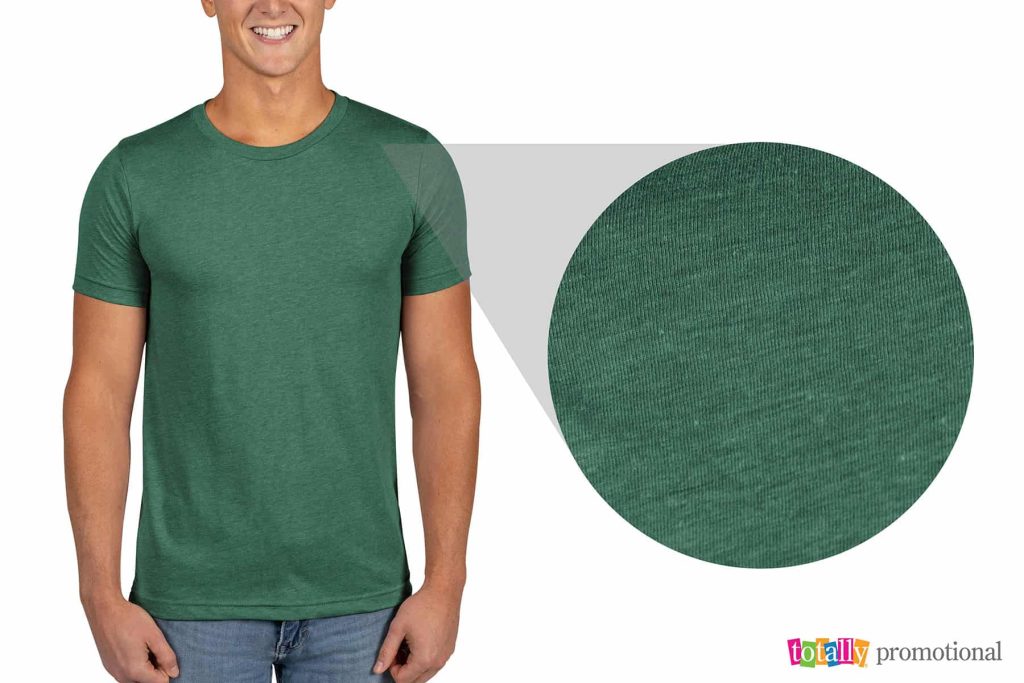
Tri-blend T-shirts are a combination of cotton, polyester and rayon fabrics. Rayon is the superhero of this trio for its super-soft feel. Think about the T-shirt in your closet that drapes your body nicely and keeps sweat from sticking. It’s probably a tri-blend fabric.
Rayon is created from purified cellulose fibers that typically originate in wood pulp. Yes, wood pulp. It’s not totally natural, though; it takes chemicals to produce rayon so it’s considered a semi-synthetic material.
Pros for tri-blend T-shirts:
- The triple-blended material absorbs moisture.
- Tri-blend fabrics are breathable.
- Rayon adds a silky, luxurious feel to tri-blend T-shirts.
- Tri-blend apparel is stretchy and comfortable.
Cons for tri-blend T-shirts:
- Tri-blend fabrics aren’t as durable as other materials.
- Washing tri-blends can cause some shrinkage.
- Rayon and polyester are processed fabrics.
Industry tip: Tri-blend T-shirts are highly recommended for students and corporate gifts.
A customer favorite: Bella+Canvas® Triblend Unisex Tee
So what is the best quality fabric for T-shirts?
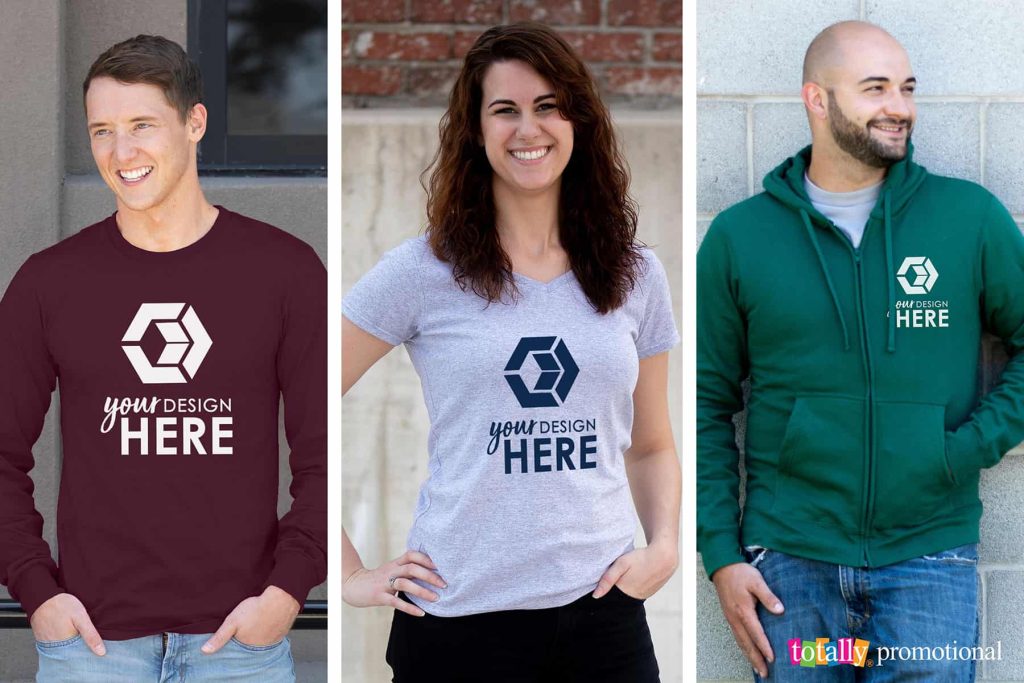
Our Totally Promotional team knows a lot about T-shirts. Heck, we even created a T-shirt glossary to share our knowledge! Our 30+ years of experience tells us the best fabric for T-shirts depends on how they’ll be used. The answer is different for every customer.
A Little League coach might want durable T-shirts for his rowdy team. A corporate procurement agent wants T-shirts that won’t easily wrinkle. The guide above can help everyone determine the right T-shirt fabric for their particular situation.
If you’re still not sure, contact one of our friendly and helpful staff members. We love our tees and we’re sure you will, too!



